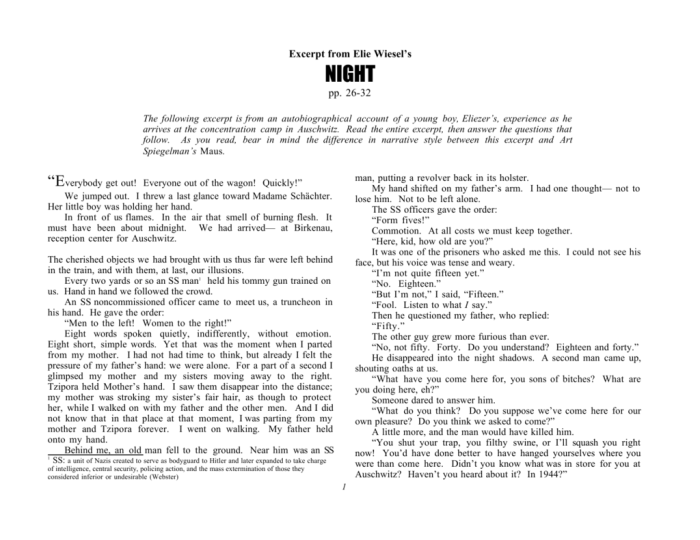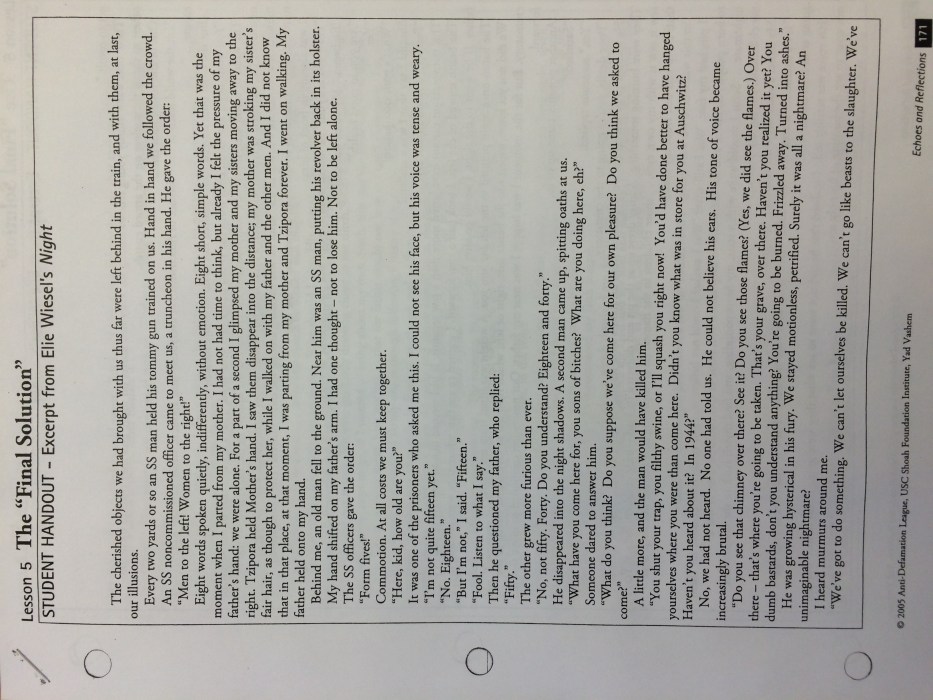Excerpt from night elie wiesel – In Elie Wiesel’s searing memoir, “Night,” the horrors of the Holocaust unfold through the eyes of a young boy. This poignant excerpt offers a glimpse into the depths of human suffering, resilience, and the enduring power of memory.
Wiesel’s unflinching account transports readers to the heart of Auschwitz, where the unimaginable becomes reality. Through his vivid prose and evocative imagery, he paints a chilling portrait of life and death within the confines of a Nazi concentration camp.
Historical Context: Excerpt From Night Elie Wiesel

The Holocaust, a systematic genocide perpetrated by the Nazi regime, stands as one of the darkest chapters in human history. During World War II, Nazi Germany, led by Adolf Hitler, embarked on a genocidal campaign against Jewish people, resulting in the extermination of approximately six million individuals.
The persecution of Jewish people intensified after the Nazi Party came to power in 1933. Through a series of discriminatory laws and policies, known as the Nuremberg Laws, Jewish citizens were stripped of their basic rights, barred from public life, and forced into ghettos.
The horrors of the Holocaust reached their peak with the implementation of the “Final Solution,” a Nazi plan to exterminate all European Jews.
Nazi Ideology and Anti-Semitism
- The Nazi ideology was rooted in anti-Semitism, a deep-seated hatred and prejudice against Jewish people.
- Nazis believed that Jews were inferior and posed a threat to the German nation and its aspirations for racial purity.
- This ideology fueled the systematic persecution and eventual genocide of Jewish people.
Personal Narrative
Elie Wiesel, a prominent Holocaust survivor, penned “Night,” a searing memoir that chronicles his harrowing experiences in Nazi concentration camps during World War II. As a young Jewish boy, Wiesel endured unimaginable horrors and witnessed firsthand the atrocities perpetrated by the Nazi regime.
Key Events and Themes
The excerpt from “Night” captures Wiesel’s arrival at the Auschwitz-Birkenau concentration camp, a pivotal moment that marked the beginning of his ordeal. The passage vividly depicts the dehumanizing process endured by prisoners upon arrival, including the separation of families, the shaving of heads, and the assignment of numbers to replace names.
The haunting words of Elie Wiesel’s “Night” echo the horrors endured by countless individuals throughout history. Just as Harriet Beecher Stowe’s “Uncle Tom’s Cabin” ( uncle tom’s cabin mark twain ) exposed the brutality of slavery, Wiesel’s memoir serves as a stark reminder of the atrocities committed during the Holocaust.
Both works stand as poignant testaments to the resilience and indomitable spirit of those who have faced unimaginable suffering.
Wiesel’s account also highlights the pervasive themes of loss, suffering, and the struggle for faith in the face of unimaginable adversity.
Literary Analysis

Elie Wiesel employs a rich tapestry of literary devices in Nightto convey the horrors of the Holocaust and its profound emotional impact on the victims. These devices include symbolism, imagery, and metaphor, each contributing to the novel’s powerful and unforgettable narrative.
Symbolism
Wiesel uses symbols extensively throughout the novel to represent the dehumanization and suffering endured by the prisoners. For instance, the cattle cars symbolize the transportation of prisoners like animals, while the ovens at Auschwitz represent the industrialization of death.
Imagery
Wiesel’s vivid and haunting imagery immerses the reader in the horrors of the concentration camps. He describes the prisoners as “skeletons” and “walking corpses,” evoking the physical and psychological toll of their ordeal. The frequent use of darkness and fire imagery conveys the sense of despair and destruction that permeated the camps.
Metaphor
Wiesel employs metaphors to compare the prisoners’ experiences to other events or objects. For example, he refers to the concentration camps as “a vast graveyard” and compares the prisoners’ suffering to “a wound that never heals.” These metaphors amplify the emotional impact of the Holocaust and emphasize its lasting legacy.
Themes and Symbolism

The excerpt from Elie Wiesel’s “Night” explores profound themes that resonate deeply with the horrors of the Holocaust. One central theme is the immense suffering endured by the prisoners. The graphic descriptions of starvation, disease, and violence paint a harrowing picture of the dehumanizing conditions they faced.Another
prominent theme is the resilience of the human spirit. Despite the unimaginable suffering, many prisoners clung to hope and found ways to resist their oppressors. Wiesel’s own experiences as a young boy in Auschwitz serve as a testament to the indomitable spirit that can survive even the darkest of times.Finally,
the excerpt raises questions about the loss of faith. The prisoners’ experiences in the concentration camp challenge their beliefs in a just and benevolent God. The suffering they witness and endure forces them to confront the limits of human understanding and the fragility of their faith.
Symbolism
Wiesel employs powerful symbolism throughout the excerpt to convey the horrors of the Holocaust and the prisoners’ experiences. The title “Night” itself is symbolic of the darkness and despair that enveloped the concentration camps. The constant presence of darkness represents the absence of hope and the dehumanization of the prisoners.The
concentration camp itself becomes a symbol of the systematic destruction and evil perpetrated by the Nazis. The barbed wire fences, the gas chambers, and the crematoria are all chilling reminders of the horrors that took place within those walls.Finally, the prisoners’ tattoos serve as a haunting symbol of their identity and suffering.
The numbers etched into their skin are a constant reminder of their status as mere objects in the eyes of their captors.
Impact and Legacy

Elie Wiesel’s “Night” has had a profound impact on readers worldwide, leaving an enduring legacy in Holocaust literature and human rights advocacy.
Impact on Readers
Through its unflinching depiction of the horrors of the Holocaust, “Night” has served as a powerful tool in educating and sensitizing readers about the atrocities that occurred during this dark period. The book’s vivid descriptions and raw emotional power have deeply affected readers, fostering a greater understanding of the human capacity for both good and evil.
Contribution to Holocaust Literature, Excerpt from night elie wiesel
“Night” is considered a seminal work in Holocaust literature, standing alongside other renowned memoirs such as Primo Levi’s “If This Is a Man” and Anne Frank’s “The Diary of a Young Girl.” Wiesel’s unique perspective as a child survivor adds a deeply personal and poignant dimension to the literature, contributing to a broader understanding of the Holocaust experience.
Elie Wiesel’s Advocacy
Beyond its literary impact, “Night” has played a crucial role in Elie Wiesel’s lifelong advocacy for human rights and his role as a witness to the Holocaust. The book’s publication propelled Wiesel into the public sphere, where he became a tireless campaigner against intolerance, hatred, and genocide.
Recognition and Legacy
Wiesel’s advocacy and the enduring power of “Night” have been widely recognized. He was awarded the Nobel Peace Prize in 1986 for his efforts to combat violence, oppression, and racism. The United States Holocaust Memorial Museum in Washington, D.C., houses the Elie Wiesel Archive, preserving his legacy as a survivor, writer, and human rights advocate.
User Queries
What is the significance of the title “Night”?
The title “Night” symbolizes the darkness and despair that enveloped the victims of the Holocaust.
How does Wiesel use literary devices to convey the horrors of the Holocaust?
Wiesel employs vivid imagery, symbolism, and metaphors to evoke the emotional and physical anguish experienced by the prisoners.
What is the lasting impact of “Night”?
“Night” has become a seminal work in Holocaust literature, serving as a poignant reminder of the horrors of genocide and the resilience of the human spirit.